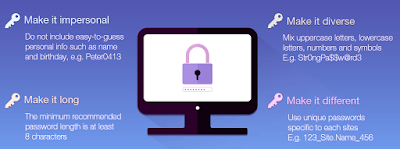Ransomware has created huge loss both in terms of data masses and economy, being infected in more than 2,30,000 Windows PC across 150 countries, starting from the last week of April, 2017.
WannaCry and Petya are the latest and most powerful ransomware appeared in the recent times. Both the ransomware work in a similar approach but differs in obtaining the ransom from the victim. The ransomware exploits a PC based on the vulnerabilities in the PCs operated with Windows XP. Once exploited successfully, all the files of the victim computer are encrypted with a unique key, that is known only to the attacker. The data on the system is decrypted only when the demanded "ransom" is paid to the attacker. WannaCry ransomware just demands some ransom from the victim but, Petya demands only in BitCoin currency.
This article presents you four ways to protect yourself from the ransomware attack. Remember that a PC connected to the internet is vulnerable in some way or the other. These the preventive measures to stay secured.
Read more: Most horrible security breaches in the history of internet.
1. Be careful with you activities on social media:
Social Media is the place where we meet lot of strangers. When we are active on social media, we post many of our daily activities; we accept friend request from strangers, we join groups just after coming across some attractive links and so on. Ransomware is infected through the links you click on the internet. So, be careful when you are clicking a link. Just look at the URL structure. It may have some meta data related to the destination of the link. At least google the keyword that you see in the link, if you find the URL suspicious. Also, be warned when you share something on social media. Choose the people carefully, with whom you share your social activity.
2. Ignore mails from unknown sources:
E-mail is the major source of phishing, security breach, data loss and spamming. Ignore mails from unknown sources. We normally get mails stating that we you've won a lottery and a huge amount is going to be yours. Be aware that these are fake mails that may result in phishing.
Also, mails offering jobs - these are another kind of exotic mails that lead to be trapped. Everyone of us need a job. When we click on such links, they may lead to untrusted and malicious destinations.
When you get a mail offering something for free of cost or at a cost of exchange, forwarding the e-mail, DO NOT do that. They are traps to get the secured information from your PC. In case you get such mail, rely on case studies - just search the text you see in the mail as-it-is. You will come across such incidents posted in different forums. Go through them and then decide if the mail is legitimate or not.
3. Don't use the same old password for decades:
You may feel that you are protected just because you've set a password to you account. But, YOU'RE NOT! Passwords provide just a preliminary restriction to the access of your account. Go through the article Are passwords really secure enough for more details related to password security.
DO NOT use the same password for a long duration. Keep changing the passwords. Get notification from your account on every login, through the settings available. Use complex passwords, that consist of combination of alpha numeric, symbols and special characters. Also, avoid using the same password for different accounts of your online existence.
4. Keep your Windows OS updated:
WannaCry attack was initiated based on the vulnerability of Windows XP. Though Windows has shutdown the support for Windows XP long back, Microsoft has released security patches to protect the systems against the ransomware attack. So, update your PC with every update you get. You never know which updates patches which vulnerability of the OS. Even for a PC, password matters. So, use the complex password for unlock your PC.
PS: Any ransomware or malware attack needs to restart the PC to start its attack. So, be careful with the boot text you get when you are booting your PC. If you find something suspicious, just switch off your PC on-spot and backup your data.
WannaCry and Petya are the latest and most powerful ransomware appeared in the recent times. Both the ransomware work in a similar approach but differs in obtaining the ransom from the victim. The ransomware exploits a PC based on the vulnerabilities in the PCs operated with Windows XP. Once exploited successfully, all the files of the victim computer are encrypted with a unique key, that is known only to the attacker. The data on the system is decrypted only when the demanded "ransom" is paid to the attacker. WannaCry ransomware just demands some ransom from the victim but, Petya demands only in BitCoin currency.
 |
| Image source: Domainzguru |
Read more: Most horrible security breaches in the history of internet.
1. Be careful with you activities on social media:
Social Media is the place where we meet lot of strangers. When we are active on social media, we post many of our daily activities; we accept friend request from strangers, we join groups just after coming across some attractive links and so on. Ransomware is infected through the links you click on the internet. So, be careful when you are clicking a link. Just look at the URL structure. It may have some meta data related to the destination of the link. At least google the keyword that you see in the link, if you find the URL suspicious. Also, be warned when you share something on social media. Choose the people carefully, with whom you share your social activity.
2. Ignore mails from unknown sources:
E-mail is the major source of phishing, security breach, data loss and spamming. Ignore mails from unknown sources. We normally get mails stating that we you've won a lottery and a huge amount is going to be yours. Be aware that these are fake mails that may result in phishing.
Also, mails offering jobs - these are another kind of exotic mails that lead to be trapped. Everyone of us need a job. When we click on such links, they may lead to untrusted and malicious destinations.
 |
| Lottery mail scam |
 |
| Job offer letter Scams |
You may feel that you are protected just because you've set a password to you account. But, YOU'RE NOT! Passwords provide just a preliminary restriction to the access of your account. Go through the article Are passwords really secure enough for more details related to password security.
DO NOT use the same password for a long duration. Keep changing the passwords. Get notification from your account on every login, through the settings available. Use complex passwords, that consist of combination of alpha numeric, symbols and special characters. Also, avoid using the same password for different accounts of your online existence.
 |
| Complex password strategies |
WannaCry attack was initiated based on the vulnerability of Windows XP. Though Windows has shutdown the support for Windows XP long back, Microsoft has released security patches to protect the systems against the ransomware attack. So, update your PC with every update you get. You never know which updates patches which vulnerability of the OS. Even for a PC, password matters. So, use the complex password for unlock your PC.
PS: Any ransomware or malware attack needs to restart the PC to start its attack. So, be careful with the boot text you get when you are booting your PC. If you find something suspicious, just switch off your PC on-spot and backup your data.












0 comments:
Post a Comment